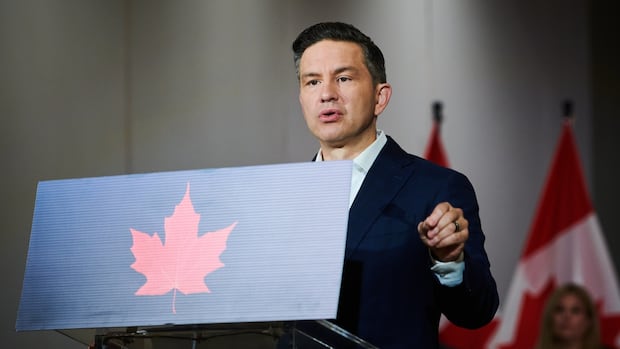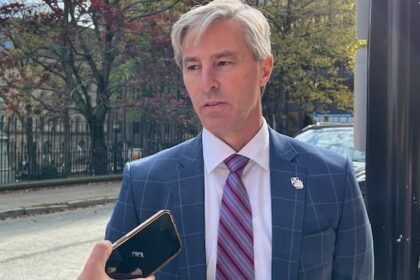SaskatoonA University of Regina professor says Pierre Poilievre’s call to scrap the temporary foreign worker program is playing on the sentiments of a growing anti-immigrant narrative in the country and is not based on evidence.Call to scrap program not evidence-based, runs risk of ‘situation where we demonize newcomers’: profHannah Spray · CBC News · Posted: Sep 05, 2025 6:00 AM EDT | Last Updated: 2 hours agoAndrew Stevens, an associate professor at the University of Regina in the Hill and Levene Schools of Business, says more robust enforcement of Canada’s current immigration streams is a better solution than scrapping the temporary foreign worker program. (CBC)A University of Regina professor says Pierre Poilievre’s call to scrap the temporary foreign worker program is playing on the sentiments of a growing anti-immigrant narrative in the country and is not based on evidence.On Wednesday, the Conservative leader called on the federal Liberal government to axe the program, saying it floods the market with cheap labour and makes it harder for young Canadians to find work.”I think you’re playing politics with something that should be governed by good, evidence-based decisions,” Andrew Stevens, an associate professor at the University of Regina in the Hill and Levene Schools of Business, said in an interview on Thursday.There are also contradictions in Poilievre’s approach, given other statements he has made about unleashing an energy economy, Stevens said, with some provinces being quite dependent on immigration.”Saskatchewan in particular has really tethered its economic development strategy and ambition to population growth, and we’re just not seeing Canadians moving from other parts of the country on the scale that is required,” he said.Instead, different migrant streams, like the immigrant nominee programs and temporary worker programs, have been the pathway to growth, he said.When asked about Poilievre’s comments, Saskatchewan Premier Scott Moe said it’s always fair for different levels of government to discuss immigration metrics and priorities.Saskatchewan Premier Scott Moe, right, speaking alongside Trade Minister Warren Kaeding in Saskatoon on Thursday, says Saskatchewan’s immigrant nominee program has been ‘drastically’ cut back by the federal government. (Thomas Simon/Radio-Canada)”Saskatchewan’s voice in that has always been to really centre any solid immigration policy around economic immigration that is good for those that are immigrating … and their family, but also good for the community where they will reside, good for the province and good for Canada,” Moe said at a Thursday news conference in Saskatoon.He noted that the Saskatchewan immigrant nominee program has been “drastically” cut back by the federal government. Earlier this year, the province paused the program for five weeks before rebooting it with reworked rules that prioritize applications for workers in health care, agriculture and skilled trades.One sector that relies on temporary foreign workers is the agriculture sector. Poilievre said that while he wants to scrap the TFW program, he would create a separate, stand-alone program for agricultural labour.That idea is similar to a call by the Wheat Growers Association on Thursday for a dedicated agriculture stream within the TFW program.WATCH | Poilievre calls for temporary foreign worker program to be scrapped: Poilievre calls for temporary foreign worker program to be scrappedConservative Leader Pierre Poilievre called on the government to abolish the temporary foreign worker program at a news conference on Wednesday. Poilievre says the program has oversaturated the market with cheap labour, making it challenging for young Canadians to secure employment.In a news release, the association noted the number of temporary foreign workers in agriculture has grown to almost 80,000, from 17,000 in 2005.Jeremy Welter, vice-president of the Agricultural Producers Association of Saskatchewan, said it’s good that Poilievre recognized the need for a robust labour force in agriculture, but questioned how the parameters would be drawn.For example, he wondered whether trucking, which is integral to many farm operations, would qualify as being part of the agriculture industry. Similarly, heavy-duty mechanics and people working in the food processing industry are also key.”It’s good to see that there was an initial plan for a carve-out … for agriculture. But of course it begs the question, what are the details? You know, they say the devil is in the details,” Welter said in an interview.Stevens said one of his biggest concerns is that both the Opposition Conservatives and Liberal government have been letting industry and business “dictate the policies” in terms of Canada’s immigration system, which in turn empowers them to “put the brakes” on wage increases and continue to provide poor employment conditions.A better solution, Stevens said, is to provide more robust enforcement of the rules that are in place — for example, by ensuring employers are trying to fill jobs locally first and cracking down on employers that are taking advantage of vulnerable foreign workers.”I think we do need to have a serious conversation about youth unemployment, employment opportunities, but I think we have to have an honest one,” he said.”And I think we should drive it with evidence. Otherwise, we find ourselves in a situation where we demonize newcomers, and then when the economy picks up in certain regions, we don’t have access to that workforce that we need.”ABOUT THE AUTHORHannah Spray is a reporter and editor for CBC Saskatoon. She began her journalism career in newspapers, first in her hometown of Meadow Lake, Sask., moving on to Fort St. John, B.C., and then to the Saskatoon StarPhoenix.
Poilievre ‘playing politics’ by targeting temporary foreign workers, U of Regina prof says











